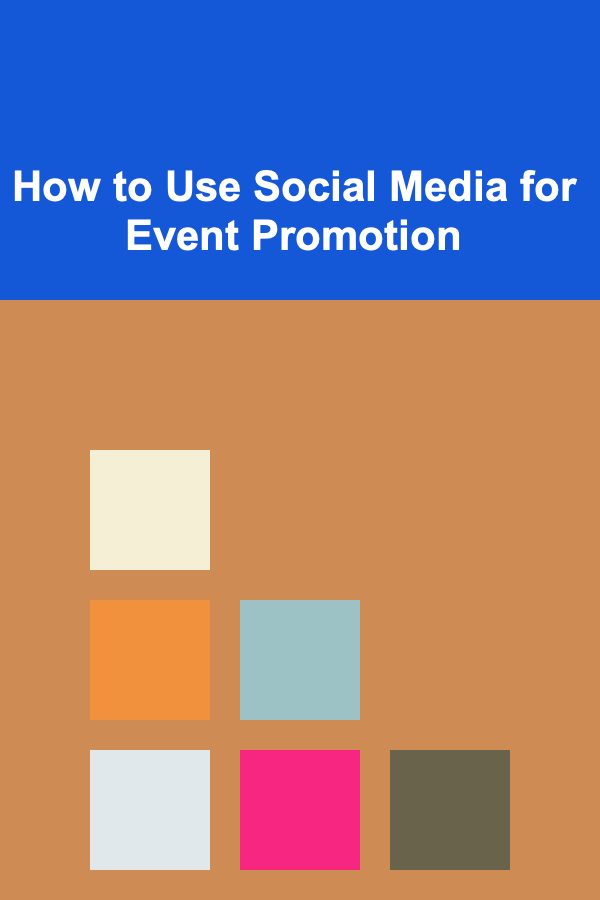
How to Use Social Media for Event Promotion
ebook include PDF & Audio bundle (Micro Guide)
$12.99$10.99
Limited Time Offer! Order within the next:

Social media has become one of the most powerful tools for event promotion. With billions of users worldwide, platforms like Facebook, Instagram, Twitter, LinkedIn, and TikTok offer a huge potential audience. However, effectively leveraging these platforms for event promotion requires more than just posting a few updates and hoping for the best. It involves strategic planning, consistent engagement, and understanding your target audience. This article will explore the best practices and techniques to use social media effectively to promote events and ensure their success.
Understand Your Audience
Before jumping into event promotion on social media, it's crucial to understand who your target audience is. Social media platforms attract different demographic groups, so identifying where your potential attendees spend their time online is the first step in crafting an effective promotional strategy.
Researching Your Audience
Start by analyzing the demographics and preferences of the people you're trying to reach. Use analytics tools on social media platforms to determine the age, location, gender, and interests of your followers. For example:
- Facebook Insights and Instagram Insights provide detailed demographic information about your followers.
- Twitter Analytics helps you understand what type of content resonates with your audience.
- LinkedIn Analytics provides professional data, which is useful if you're promoting business events or networking events.
By understanding your audience, you can tailor your event content to appeal to them and choose the right platform to focus on.
Choose the Right Platforms
Not all social media platforms are the same, and not all are suited for every type of event. Depending on your event type and audience, some platforms will be more effective than others. Here's a breakdown of the most popular platforms and the types of events they are best for:
- Facebook: Great for community-based events, workshops, and large-scale conferences. Facebook allows you to create events, post regular updates, and engage with attendees.
- Instagram: Perfect for visually-driven events like art exhibitions, fashion shows, concerts, and festivals. Instagram's visual format allows you to post stunning images and videos that can entice potential attendees.
- Twitter: Ideal for real-time updates, announcements, and live events. It works well for events that require constant engagement and updates, such as conferences, live webinars, and product launches.
- LinkedIn: Best for business and professional events, conferences, and seminars. LinkedIn is ideal for reaching a business-oriented audience and connecting with industry professionals.
- TikTok: Excellent for creating viral content and engaging younger audiences for creative, fun, and unique events, such as product launches, pop-up experiences, or influencer-driven promotions.
By identifying the most relevant platforms for your event, you ensure that your content reaches the right people in the most effective way.
Create Engaging Content
Content is at the heart of any social media campaign. To successfully promote your event, the content you create needs to be both engaging and informative. Here are some ideas for creating high-quality content that captures attention:
Visual Content
Social media is a visual medium, and posts with images or videos perform better than text-based content. Use high-quality images, videos, and graphics to catch people's attention as they scroll through their feeds.
- Teaser Videos: Create short videos that highlight the key attractions of your event. These can be behind-the-scenes looks, sneak peeks, or introductions to the speakers or performers.
- Infographics: Use infographics to highlight important event details like the schedule, guest list, and ticket prices. These are easy to share and make the information more digestible.
- Live Streams: Broadcast events live on platforms like Instagram Live, Facebook Live, or YouTube. Live streaming is a great way to engage audiences in real-time and create a sense of urgency.
Interactive Content
Engage your audience with interactive content that encourages participation. This can include:
- Polls and Surveys: Use Instagram Stories, Twitter polls, or Facebook polls to ask your audience questions related to the event. Polls and surveys are quick, easy ways to engage people and gather feedback.
- Contests and Giveaways: Host contests or giveaways where participants can win free tickets or exclusive access to your event. This incentivizes people to spread the word about your event and can generate excitement.
- Q&A Sessions: Organize live Q&A sessions where potential attendees can ask questions about the event. This is especially helpful for conferences or workshops where participants may have specific questions about the event schedule or speakers.
User-Generated Content
Encourage your audience to create and share content related to your event. This can help build excitement and reach a wider audience. You can incentivize user-generated content by creating a branded hashtag or running a content campaign. For example, ask attendees to share a photo or video of their experience and tag the event hashtag for a chance to win a prize.
Use Hashtags Effectively
Hashtags are an essential tool for increasing the visibility of your social media posts. A well-chosen hashtag can help your event content reach a broader audience and increase engagement. Here are some tips for using hashtags effectively:
- Create a Unique Event Hashtag: Create a branded hashtag specifically for your event. This makes it easier to track engagement and see all the content related to your event in one place. For example, #TechSummit2025 or #SummerFest2025.
- Use Popular Hashtags: In addition to your branded hashtag, use relevant and trending hashtags to help increase visibility. For example, if your event is related to health, you could use hashtags like #HealthTech or #FitnessEvent.
- Encourage Attendees to Use the Hashtag: Make sure to encourage your attendees to use the event hashtag when posting their own content. This helps generate organic reach and builds a sense of community around your event.
Collaborate with Influencers and Partners
Influencer marketing is a powerful way to reach a wider audience and build credibility. Partnering with influencers or industry leaders who align with your event's theme can help you reach potential attendees who might not have heard about your event otherwise. Here's how to leverage influencer partnerships:
- Choose the Right Influencers: Look for influencers who have a genuine connection to your event or industry. For example, if you're hosting a music festival, collaborate with musicians or music influencers.
- Offer Value: Offer influencers exclusive access to your event, free tickets, or promotional codes to share with their followers. In return, influencers can create content promoting your event to their audience.
- Cross-Promote: Ask influencers to cross-promote your event on their social media profiles. This can include sharing posts, stories, or videos about the event or conducting live interviews or previews.
Paid Social Media Advertising
While organic social media posts are valuable, paid advertising can give your event the extra push it needs to reach a larger audience. Here are some paid advertising strategies to consider:
Facebook and Instagram Ads
Facebook and Instagram offer robust advertising platforms that allow you to target specific audiences based on interests, location, behavior, and more. You can create event ads that promote ticket sales, provide event details, and even offer exclusive discounts.
- Event Promotion Ads: Use Facebook and Instagram's Event Ads to promote your event directly. These ads are optimized to get people to RSVP and buy tickets.
- Retargeting Ads: If someone has shown interest in your event but hasn't signed up, retarget them with ads to remind them to register or buy tickets.
Twitter Ads
Twitter ads can be effective for driving real-time engagement and encouraging users to follow event updates. You can target your ads to users who are talking about topics related to your event or event hashtag.
LinkedIn Ads
For business or professional events, LinkedIn ads can help you reach industry professionals. Use sponsored content to promote your event to your target audience and drive attendance from professionals in your field.
Monitor and Analyze Performance
Once you've started your event promotion campaign on social media, it's crucial to track and analyze its performance. Use the analytics tools provided by each platform to measure engagement, track ticket sales, and understand which content resonates most with your audience.
Key Metrics to Monitor
- Engagement Rate: This includes likes, shares, comments, and mentions. High engagement indicates that your content is resonating with your audience.
- Click-Through Rate (CTR): Measure how many people clicked on the links you posted (such as your event registration page).
- Conversion Rate: Track how many people actually signed up for your event after interacting with your posts or ads.
- Hashtag Performance: Keep track of how well your event hashtags are performing and how often they're being used.
By continually monitoring your performance and adjusting your strategy, you can ensure your social media efforts are aligned with your event goals.
Post-Event Content
The work doesn't stop after the event ends. Post-event content is an excellent way to keep the momentum going and build anticipation for future events.
- Share Recaps: Post highlights from the event, including photos, videos, and quotes from attendees. This allows people who missed the event to get a sense of what happened.
- Thank Your Attendees: Use social media to thank your attendees for their participation. You can create a personalized thank-you post or video to express appreciation for their support.
- Share Testimonials: Encourage attendees to share their experiences, and post positive feedback on your social media profiles to build credibility for future events.
Conclusion
Using social media for event promotion is a powerful strategy that can significantly increase your event's visibility and success. By understanding your audience, creating engaging content, using effective hashtags, and collaborating with influencers, you can effectively leverage social media to drive attendance, build excitement, and create lasting connections with your audience. Remember, consistency, creativity, and interaction are key to building a strong presence on social media and ensuring the success of your event.

How to Choose the Best Closet System for Your Space
Read More
How to Organize and Store Jewelry in a Clutter-Free Manner
Read More
How to Use Crowdfunding Platforms for Charitable Causes
Read More
The Ultimate Guide to Affordable Gift Ideas on a Budget
Read More
How to Set Financial Goals When You're Overwhelmed
Read More
How to Research an Art Exhibition Before You Go: A Preparation Checklist
Read MoreOther Products

How to Choose the Best Closet System for Your Space
Read More
How to Organize and Store Jewelry in a Clutter-Free Manner
Read More
How to Use Crowdfunding Platforms for Charitable Causes
Read More
The Ultimate Guide to Affordable Gift Ideas on a Budget
Read More
How to Set Financial Goals When You're Overwhelmed
Read More